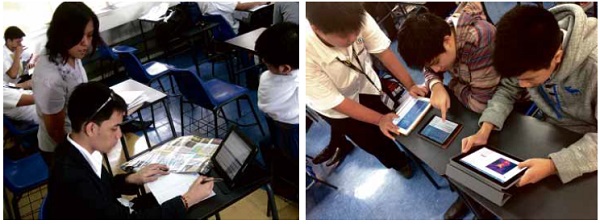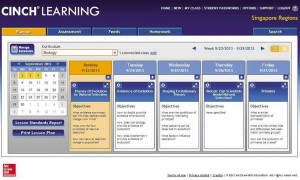Balancing high-tech and old-fashioned mentoring
Technology is changing different aspects of life and education is no exception.
In the Grade 10 science class of Ilah Yumul at Xavier School, students follow her PowerPoint lecture on the discovery of DNA through their tablets. They swipe and scroll down their e-books, type e-notes and highlight information with an e-Stabilo.
With the Xavier’s one-to-one program that started in 2007, each high school student brings to class a device loaded with applications and e-textbooks. The gadgets of choice are tabs for freshmen, sophomores and juniors, and laptops for seniors.
Initially, the goal was simply to eliminate the need to carry so many heavy books by having digital versions in mobile devices.
But, as e-learning picked up steam, teachers and students realized technology offered more than mobility.
“[In] the beginning, technology [was] just for research,” said Jane C. Cacacho, Xavier’s high school principal. “But now, we want our teachers to go further. We want them to make students create, do things they could not normally do without the gadgets.”
“[Students use] Keynote for presentations, iMovie to edit videos. They have Puppet Pals [to do] puppet shows,” said Galvin Ngo, coordinator of Xavier’s New Experiences with Technology (NeXT) team, the school’s tech integration arm.
“Students can now express their learning in different, creative ways,” Ngo said.
A tab, with a strong Internet connection, “creates a virtual classroom experience,” where communication and discussions are more open and everybody is connected to each other even after school hours, he added.
After more than five years, Xavier found that “gadgets are not magical instruments” and the integration of technology was just part of a bigger picture of an “improving pedagogy,” Cacacho said.
“They… make a very good teacher even better, but if you’re not a very good teacher and you’re not trained, it won’t really help much,” she said.
Every school year, teachers lay out their plans and the NeXT team helps them get the tools they need.
“We don’t have one standard for each class because… each subject area will need particular things. We do not want the technology to be the main focus of the classes,” Ngo said.
“So we almost never tell our teachers [which platform to use]. It’s always about helping them sift through a couple of tools, a couple of applications [to see] which ones help students learn better,” he added.
Since last year, Xavier’s high school science teachers and students have been using McGraw-Hill’s Cinch Learning, an online learning management system widely used in the United States. It is the first school in the country to use Cinch.
Aside from a compilation of McGraw-Hill e-books, Cinch offers multimedia supplements, organizers, monitoring and assessment tools, and a customizable curriculum designed within K to 12 standards.
McGraw-Hill e-books in Cinch are embedded with photos and diagrams, videos and animations.
“We supplement [the typical chalk talk] with interactive activities and with presentations and animations [conveniently] provided by Cinch,” high school science teacher Stanley Yu said.
Teachers can modify Cinch slides and append their own presentations and resources.
All PowerPoint lectures and teaching materials discussed in class are accessible through iPads, said Yumul.
Through Cinch, teachers can also monitor students’ notes and highlights on e-books, as they are conveyed to the teachers, much like Facebook status updates.
“We can actually see who are reading and who are not,” Yumul said.
Xavier’s science teachers agreed that lesson preparations were less tedious with Cinch because they not only got ready-made presentations and supplementary videos but also questions for online quizzes.
“It’s like you already have a resource base. They have lab activities, worksheets and question banks, which we used to make by reading a lot … We still check other sources but we don’t have to start from scratch,” Yumul said.
Premade tests are highly customizable, allowing teachers to choose types of examination or create tests for certain students.
Yumul said it was a relief Cinch did the checking for online assessment. Results can be monitored by the teacher for grades or evaluation and
by the student for self-assessment.
The McGraw-Hill management system also comes with a planner, where a teacher can post exam schedules, project deadlines and other reminders. Students can keep track of the class flow so they can prepare ahead.
At home, a student could seek instant help from classmates through chat boxes, convenient during exam season, said Andrew Tee, who is in third year high school.
“You can post a question on the forum and everyone can reply to it,” said Rene Tan, a sophomore.
During a lecture on energy, Joel Hawod told his Grade 9 integrated science class: “Log on to Cinch and answer the discussion question.” His students brought out their iPads and typed their answers—it was like a recitation, where everybody got to answer all at the same time.
Answers go into a thread that everybody in class can see in real-time. Comments can be exchanged, corrections made and gray areas clarified right away.
After asking a student to give his answer out loud, Hawod told the class to view other responses and post comments later, then instructed them to put the tabs away. Focus promptly shifted back to the board.
Cacacho agreed that technology engaged students more but said that it was not an end in itself.
“We’ve always had to remind our teachers that we don’t teach for technology’s sake. It all boils down to what the lesson is, what we want them to learn. Technology makes it better,” she said.
Basics have to be learned
Xavier’s high school science coordinator Roberto Jose de la Cruz said even digital natives should still know the basics, like using a graduated cylinder, a beam balance or a barometer.
He pointed out that technology had its limits and both teachers and students should know when not to use it.
Yu said teachers should guard against overdependence that could turn students into passive, silent and detached- from-the-real-world gadget users.
“Teachers ensure that technology is properly used, controlled and monitored,” Hawod said.
“We try to train them (students) to be responsible users of the gadget in school and to recognize that those gadgets are there to help them learn and not to become greater distractions,” Yumul added.
Cacacho admitted the parents were initially concerned that the gadgets would be distractions.
But the school explained it was better that the students be guided on the use of technology instead of exploring it on their own.

